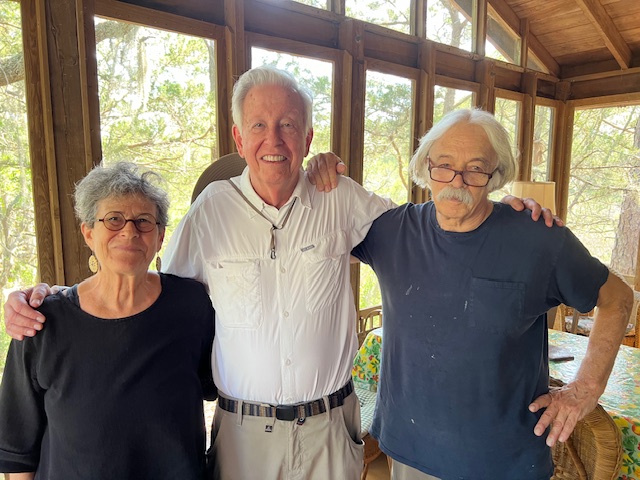Last month my wife and I traveled to the Spoleto music festival in Charleston. S.C., in part to celebrate our wedding anniversary (43). While there, we also met with my collaborators in our latest, cold case, nonfiction project: “Murder in the Rectory.” For now, I’ll just say that the case involves a murder in the South in the 1930s in which we believe an African American janitor was unjustly convicted of killing a prominent white man. More to come.
My two collaborators in this project are Stephen Hoffius, co-author of Upheaval in Charleston: Earthquake and Murder on the Eve of Jim Crow (University of Georgia Press), among other Charleston and South Carolina histories. And Andy Berlin, an advertising icon from the 1980s and 1990s. Both are my friends from Duke undergraduate days. We had a productive meeting.
Equally important to our anniversary and our book meeting, the trip also enabled me to finally meet two eminent Southern researchers, Ted and Dale Rosengarten, both of whom I have long admired.
Ted, winner of a MacArthur Fellowship, is author of the classic All God’s Dangers: The Life of Nate Shaw (University of Chicago Press). That ground-breaking, 1975 book, chronicled the life of an African American farmer who was a part of the Alabama Sharecroppers Union and battled racism in the 1930s, and helped propel the oral history movement. Ted is one of a group of then-young academics in the 1970s who I refer to as exemplars of “the political uses of history.” Along with other pioneering oral histories, like Nell Irvin Painter’s The Journey of Hosea Hudson, and Peter Wood’s recently reissued Black Majority, they carried on the corrective, revisionist tradition of W.E.B. Dubois, E. Franklin Frazier and John Hope Franklin. Ted is also an academic and authority on the Holocaust and over the years has taught at the College of Charleston and Duke, among other universities.
Dale is a published expert on subjects as disparate as the sweetgrass baskets woven by African American craftspeople in South Carolina’s low country, and the Jews of South Carolina. She has organized outstanding exhibitions on both subjects.
Both are also longtime civic activists, especially in local public education.
We had a wonderful lunch on the screened porch of their beautiful, hand-crafted house in the wetlands outside of McClellanville, S.C., near the Santee River, where they have lived for more than 40 years.
Ted, who bears an uncanny resemblance to the actor Tom Conti playing Albert Einstein in the movie “Oppenheimer” (at least to me), was everything I expected he would be: scholarly, avuncular, funny, and broadly informed about current national and world events. Dale, a refreshingly acute observer of local and regional culture and politics, took us on a tour of the area after the meal.
It was a great afternoon with two extraordinary people.
(Photo by Sarah M. Brown)
